Body Worn Insect Repellent Market Research, 2031
The global Body Worn Insect Repellent Market Size was valued at $7.22 billion in 2021, and is projected to reach $15.05 billion by 2031, growing at a CAGR of 7.9% from 2022 to 2031.
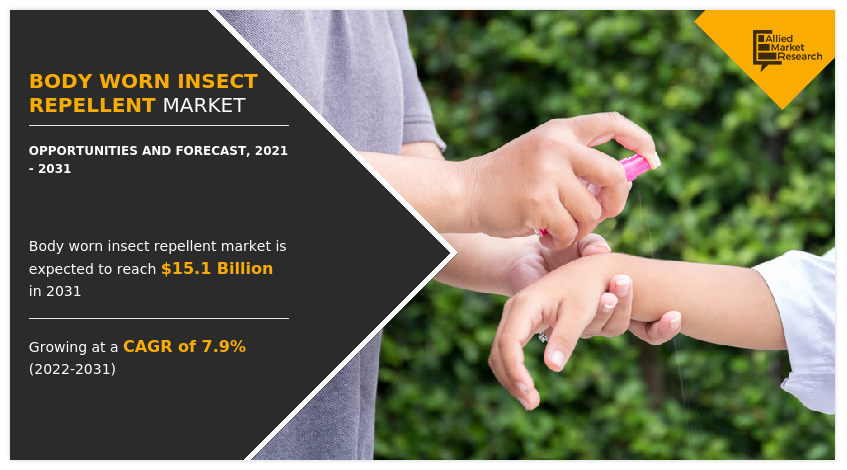
The body worn insect repellent market is segmented into Application, Distribution Channel, Insect Type, Product Type and Age Group.
Body worn insect repellents are applied directly to the skin, clothes, or other surfaces to deter ticks, flies, and mosquitoes. These compounds used in manufacturing insect repellents have great harmful effects to reduce biting incidents and stop the spread of illnesses and viruses. As microcapsules in stickers and patches provide a powerful scent all over the body, they are the most advanced product line. Due to the fact that DEET products shouldn't be used on infants, major corporations are concentrating on developing new products for newborns such as insect repellent lotion by Sawyer.
The demand for body worn insect repellent is on the rise, due to inclination of customers toward healthy and safety living. Consumers' concerns about their health may lead to a rise in the Body Worn Insect Repellent Market Share. The COVID-19 virus has not been shown to be spread by insects, yet as a precaution, people continue to purchase insect repellents. Because of the COVID-19 epidemic, the need for mosquito repellent wristbands is rising, especially in affluent countries. As the incidence of malaria and dengue fever continues to rise, some businesses are lobbying government officials to include body worn insect repellents on the list of essentials for travelers and residents alike. Plant-based or naturally occurring insect repellents are becoming increasingly popular as a means of reducing the environmental impact of these products in the present climate.Apparels are also in high demand among those who like tracking, camping, and other outdoor activities.
The body worn insect repellent market is segmented into insect type, product type, age group, application, distribution channel and region. On the basis of insect type, the market is classified into mosquito, bugs, fly repellent, and others. On the basis of product type, the market is classified into apparel (trousers, shirts, jackets, head nets, and others), oil & creams, and others (stickers & patches, sprays). By age group, it is categorized into, below 18 years, below 60 years, and above 60 years. Depending on application, it is segmented into household purpose, commercial purpose, and livestock. By distribution channel it is further divided into supermarkets & hypermarkets, specialty stores, online sales channel, and others. Region wise, the market is analyzed across North America, Europe, Asia-Pacific, and LAMEA.
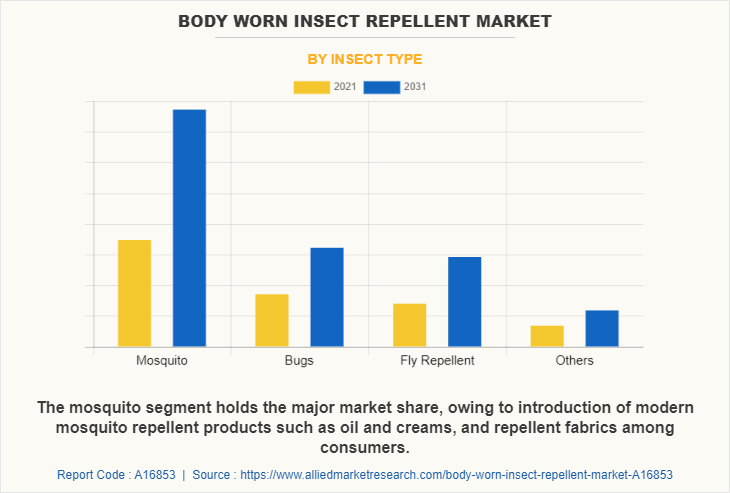
By insect type, the mosquitos segment dominates the global Body Worn Insect Repellent Market Growth, as of all disease-transmitting insects, the mosquito is the greatest menace, spreading malaria, dengue and yellow fever, which together are responsible for several million deaths and cases every year.
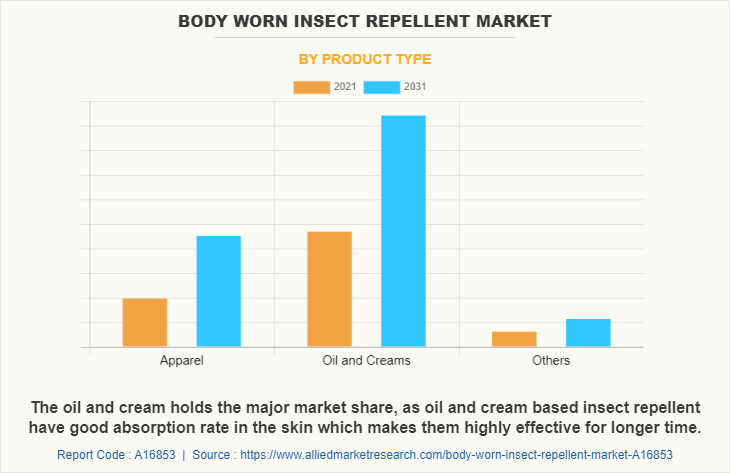
By type, the oil and cream segment dominated the global body worn insect repellent market, owing to advantages and ease to use. In addition, the presence of various popular brands such as Coghlan's Ltd., Dabur International Ltd, Emesis group, and Forest essentials boosts the expansion of advanced and high quality body worn insect repellent products.
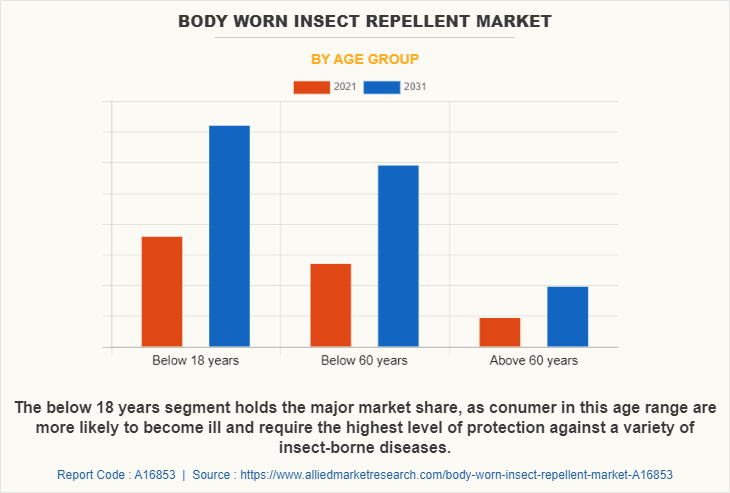
The age group of below 18 years is dominant in the market, owing to rise in preference for body worn insect repellent cream and oils and net products, as this age group requires more precautions against this spreadable disease, due to week immunity. Developing regions of North America and LAMEA, are anticipated to provide great opportunities to the market during the forecast period. This is attributed to existence of market players and unexplored market opportunities in nations.
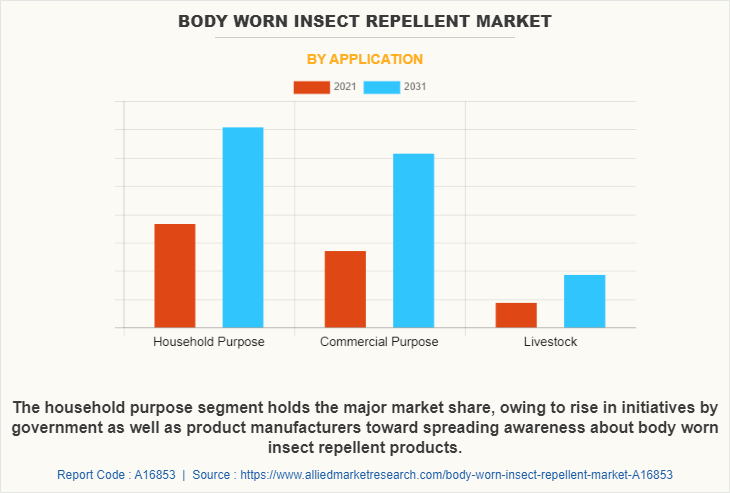
The body worn insect repellents are mostly preferred by households. This is attributed to rise in awareness about health and hygiene among consumers has boosted the market growth. . In addition, the degree of education of the users and the location both affect how often they are used. The body-worn insect repellants that are used in households are often mosquito sprays, cream lotions, and netting.
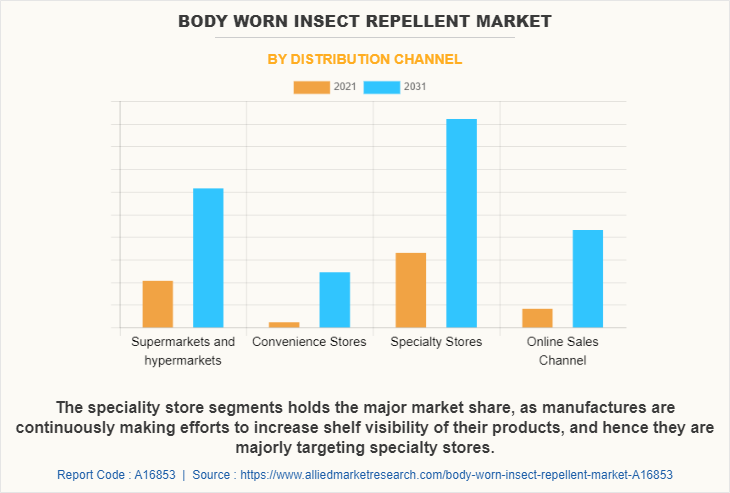
By distribution channel, consumers purchase body worn insect repellent by various distribution channels including supermarkets & hypermarkets, specialty stores, online sales channel, and others. The online sales channel is witnessing growth at the highest rate, owing to benefits provided such as discounts and free home delivery, whereas specialty stores hold a major market share.
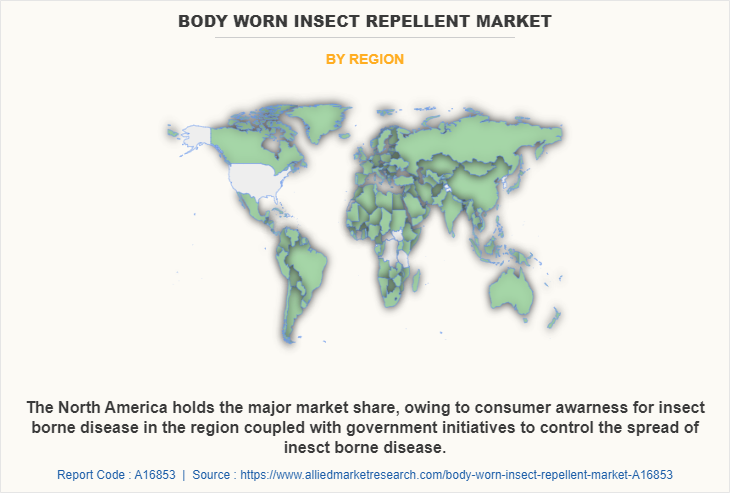
Region wise, North America dominated the market with the largest share during the Body Worn Insect Repellent Market Forecast. Body worn insect repellents and their different varieties are the most used in North America, especially in the U.S., Canada and Mexico. The preference for different types of body worn insect repellent changes with different geographical locations. Thus, rise in preference for healthy and safe living as well as increase in demand for adventure sports are driving the growth of the body worn insect repellent in North America.
The major players analyzed for body worn insect repellent industry are Coghlan's Ltd., Dabur International Ltd., Emesis Group, Forest Essentials, Godrej Consumer Products Limited, Himalaya Global Holdings Ltd., JYOTHY LABORATORIES LTD., Kama Ayurveda, Mambino Organics, Natura &Co, Osmosis Beauty, Reckitt Benckiser Group plc., S. C. Johnson & Son, Inc., and Sawyer Products, Inc.
Key Benefits For Stakeholders
- This report provides a quantitative analysis of the market segments, current trends, estimations, and dynamics of the body worn insect repellent market analysis from 2021 to 2031 to identify the prevailing body worn insect repellent market opportunities.
- The market research is offered along with information related to key drivers, restraints, and opportunities.
- Porter's five forces analysis highlights the potency of buyers and suppliers to enable stakeholders make profit-oriented business decisions and strengthen their supplier-buyer network.
- In-depth analysis of the body worn insect repellent market segmentation assists to determine the prevailing market opportunities.
- Major countries in each region are mapped according to their revenue contribution to the global market.
- Market player positioning facilitates benchmarking and provides a clear understanding of the present position of the market players.
- The report includes the analysis of the regional as well as global body worn insect repellent market trends, key players, market segments, application areas, and market growth strategies.
Body Worn Insect Repellent Market Report Highlights
| Aspects | Details |
| Market Size By 2031 | USD 15.1 billion |
| Growth Rate | CAGR of 7.9% |
| Forecast period | 2021 - 2031 |
| Report Pages | 320 |
| By Application |
|
| By Distribution Channel |
|
| By Insect Type |
|
| By Product Type |
|
| By Age Group |
|
| By Region |
|
| Key Market Players | Spectrum Brands Holdings, Inc., dabur international ltd, New Avon LLC, S. C. Johnson and Son, Inc., 3M, Johnson and Johnson Services, Inc, PIC Corporation, Himalaya Herbals, Jyothy Laboratories Ltd. (JLL), Homs LLC, Reckitt Benckiser Group plc., Sawyer Products, Inc., ExOfficio LLC, Godrej Consumer Products Limited, Coghlan's Ltd |
Analyst Review
North America holds the largest share in the global body worn insect repellent market owing to higher demand for insect repellent products in countries such as the U.S. and Canada. However, the market is at a nascent stage in the rural areas due to lower level of health and hygiene consciousness. Recently, countries in North America, South America, and Africa have witnessed a surge in the demand for mosquito repellent products due to the outbreak of Zika virus caused by Aedes mosquito. Increasing demand for herbal and organic ingredient-based products is offering lucrative business opportunity for the players operating in the market.
The developing markets are characterized by higher adoption of lower priced mosquito repellents such as coils and mats. Penetration level of mosquito repellent sprays, creams, and oils prepared from organic and herbal ingredients is higher in developed markets such as North America and Europe. Moreover, the demand for such high-end products is consistently increasing in developing markets owing to factors such as rising literacy levels and increasing awareness campaigns run by government and players operating in the industry. The industry has witnessed entry of numerous small players since recent past, who manufacture and market innovative insect repellents such as wrist bands, patches, and others.
herbal based insect repellent products, innovation and development of chemical free products, and rise in spread of insect based disease are some of the upcoming trends of Body Worn Insect Repellent Market.
The body worn insect repellents are mostly preferred by households application. This is attributed to rise in awareness about health and hygiene among consumers has boosted the market growth. . In addition, the degree of education of the users and the location both affect how often they are used. The body-worn insect repellants that are used in households are often mosquito sprays, cream lotions, and netting.
Region wise, North America dominated the market with the largest share during the forecast period. Body worn insect repellents and their different varieties are the most used in North America, especially in the U.S., Canada and Mexico. The preference for different types of body worn insect repellent changes with different geographical locations. Thus, rise in preference for healthy and safe living as well as increase in demand for adventure sports are driving the growth of the body worn insect repellent in North America.
The body worn insect repellent was valued at $ 7,224.5 million in 2021, and is projected to reach $15,048.8 million by 2031, registering a CAGR of 7.9% from 2022 to 2031.Body worn insect repellents are applied directly to the skin, clothes, or other surfaces to deter ticks, flies, and mosquitoes. These compounds used in manufacturing insect repellents have great harmful effects to reduce biting incidents and stop the spread of illnesses and viruses.
The major players analyzed for body worn insect repellent industry are Coghlan's Ltd., Dabur International Ltd., Emesis Group, Forest Essentials, Godrej Consumer Products Limited, Himalaya Global Holdings Ltd., JYOTHY LABORATORIES LTD., Kama Ayurveda, Mambino Organics, Natura &Co, Osmosis Beauty, Reckitt Benckiser Group plc., S. C. Johnson & Son, Inc., and Sawyer Products, Inc.
Loading Table Of Content...



